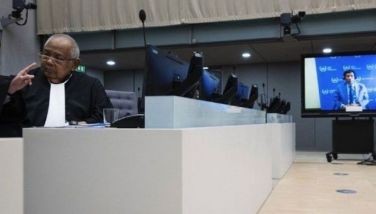The rise and fall of KAPA
MANILA, Philippines — In Valenzuela City sometime last year, inside the extension office of Kapa Community Ministry International (KAPA), a resident decided to join the ministry.
Eric, not his real name, said he was enticed to become a “KAPAmilya” because of the promise of a “blessing” in exchange for what he would be “donating” to the ministry.
“I was promised that it will be given to me monthly for the rest of my life,” he said, referring to what KAPA would likewise call a “love gift.”
Lured by this “blessing,” Eric invested P250,000 in May 2019. In exchange, he received his “deed of donation” and “certificate of membership.”
Eric was instructed to come back after one month to receive the first P75,000 return on his investment. But the office was already closed when he returned, he narrated in a complaint-affidavit filed against KAPA.
The ministry
KAPA registered as a domestic nonstock corporation in March 2017. It was organized as a religious corporation by Joel A. Apolinario, who has pitched a rags-to-riches story of a fisherman, construction worker and disc jockey.
KAPA, however, turned out to be one of the biggest investment scams to hit the country in recent years, according to the Securities and Exchange Commission (SEC).
Five million people may have been duped by this supposedly religious organization and an estimated P50 billion may have flowed into KAPA, the SEC said, citing claims made by KAPA officers and promoters.
At some point, KAPA targeted public school teachers and more than 100 investors who have filed complaints against KAPA before the Bislig City Prosecutor’s Office in Surigao del Sur, according to information received and cited by the SEC in the Cease and Desist Order (CDO) it would later issue.
At least 12 arrest warrants had been issued against Apolinario and other KAPA officers, but KAPA settled the cases.
The same thing happened with the estafa cases filed by the National Bureau of Investigation (NBI) against KAPA officials last year. Complainants withdrew their complaints and Apolinario managed to win back some supporters.
In February, however, the SEC scored a major victory against KAPA after the Regional Trial Court in Bislig City ordered the arrest of Apolinario, his wife Reyna and other KAPA officers.
The scheme
The scheme is simple. It seeks “donations” in exchange for “blessings” in the name of God. An investment of at least P10,000 would supposedly get a 30 percent monthly return for life.
But that was just too good to be true.
According to the SEC, KAPA must have generated about P15 billion in profits every month to fulfil its promise of paying five million members 30 percent of their collective P50 billion investment, assuming each member invested P10,000.
Having no concrete and profitable businesses, KAPA actually paid members out of the contributions of new recruits. Under this scheme, the P50 billion supposedly pooled by KAPA from its five million members would have diminished in three months.
KAPA, however, claimed they have numerous businesses, including a nonstock educational institution and a hospital in Tagum City. Yet, the majority of these were newly established or acquired and were not just raking in enough profits.
KAPA was nothing more than a Ponzi scheme, an investment program that offers impossibly high returns and pays existing investors using the money contributed by new investors, according to the SEC.
It was a case of robbing Peter to pay Paul, as SEC chairperson Emilio Aquino put it.
The disguise
The scheme of KAPA involved the sale and offering of securities, particularly investment contracts, to the public, according to the SEC.
Section 8 of Republic Act 8799, or The Securities Regulation Code, states that “securities shall not be sold or offered for sale or distribution within the Philippines, without a registration statement duly filed with and approved by the commission.”
KAPA neither registered any securities, nor secured a secondary license to sell securities or investment contracts
In the case of SEC versus CJH Development Corp., the Supreme Court ruled that the act of selling unregistered securities would necessarily operate as a fraud on investors as it deceives the investing public by making it appear that the company has authority to deal on such securities.
KAPA denied they had engaged in investment-taking activities, saying it had only solicited “donations” and shared its “blessings” to members.
The SEC, however, applied the so-called Howey Test introduced by the US Supreme Court in the case of US Securities and Exchange Commission versus Howey Co. in 1946 and adopted by Philippine Supreme Court in the case of Power Homes Unlimited Corp. versus the SEC in 2008.
The Howey Test lays down the four elements of an investment contract: 1) There is a placement of money. 2) The money is placed in a common enterprise. 3) There is an expectation of return. 4) And profits are derived primarily through the effort of others.
In the case of KAPA, the money invested is the donation worth at least P10,000, while the common enterprise is KAPA. The member expects profits, which KAPA has dubbed as “blessings.”
The member does not have to do anything other than wait for the payout or, at most, recruit and spread the word.
The criminal action
As early as 2017, the SEC warned the public against KAPA, after receiving tips and complaints regarding the ministry’s unauthorized investment-taking activities.
But the SEC continued receiving reports about the intensified recruitment and solicitation activities of KAPA through social media. For instance, Apolinario was featured in several videos posted on YouTube and Facebook discussing the investment scheme and inviting the public to sign up.
By February 2018, the Corporate regulator issued a CDO for KAPA to immediately stop selling or offering for sale investment contracts or any other form of securities to the public without prior registration and the corresponding permit.
The SEC then revoked the incorporation of KAPA in April 2019. President. Duterte himself would call out KAPA and order its closure two months later.
Armed with evidence gathered from its investigation, the SEC filed a criminal complaint against KAPA, Apolinario, his wife Reyna and sister Margie A. Danao, and promoters Marisol M. Diaz, Adelfa Fernandico, Moises Mopia, Catherine Evangelista and Rene Catubigan in June 2019.
Prosecutors at the Department of Justice (DOJ) would subsequently charge KAPA and its key officers and promoters for violations of The Securities Regulation Court in various courts in Bislig City, Quezon City and Antipolo.
A person found to have violated the Securities Regulation Code, or the relevant rules and regulations promulgated by the SEC, will face a maximum fine of P5 million or imprisonment of seven to 21 years, or both.
Considering the use of Facebook and YouTube in the illegal investment scheme, the DOJ recommended that the penalty to be imposed against KAPA be one degree higher, pursuant to Republic Act 10175, or the Cybercrime Prevention Act of 2012
The SEC is looking forward to the progress of cases, now pending in various courts, against KAPA following the arrest of Apolinario for syndicated estafa.
“With the mastermind already behind bars, we are positive about the progress and resolution of the criminal cases we have initiated to bring KAPA to justice,” SEC chairman Emilio Aquino said.
Aquino said the commission stands committed to protecting the public from predatory and fraudulent investment schemes, especially during the pandemic.
The outcome of the criminal action could have far-reaching implications. It could inspire or deter the rise of more predatory schemes, and propel or set back efforts to promote investing among Filipinos.
- Latest
- Trending


























